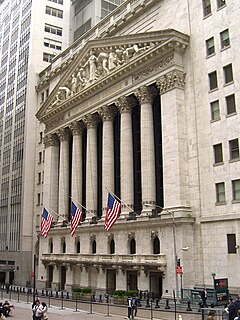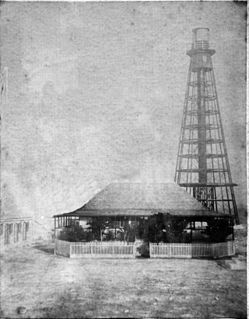
A dividend is a distribution of profits by a corporation to its shareholders. When a corporation earns a profit or surplus, it is able to pay a proportion of the profit as a dividend to shareholders. Any amount not distributed is taken to be re-invested in the business. The current year profit as well as the retained earnings of previous years are available for distribution; a corporation is usually prohibited from paying a dividend out of its capital. Distribution to shareholders may be in cash or, if the corporation has a dividend reinvestment plan, the amount can be paid by the issue of further shares or by share repurchase. In some cases, the distribution may be of assets.

A joint-stock company is a business entity in which shares of the company's stock can be bought & sold by shareholders. Each shareholder owns company stock in proportion, evidenced by their shares. Shareholders are able to transfer their shares to others without any effects to the continued existence of the company.

A treasury stock or reacquired stock is stock which is bought back by the issuing company, reducing the amount of outstanding stock on the open market.

Corporate law is the body of law governing the rights, relations, and conduct of persons, companies, organizations and businesses. The term refers to the legal practice of law relating to corporations, or to the theory of corporations. Corporate law often describes the law relating to matters which derive directly from the life-cycle of a corporation. It thus encompasses the formation, funding, governance, and death of a corporation.

Salomon v A Salomon & Co Ltd[1896] UKHL 1, [1897] AC 22 is a landmark UK company law case. The effect of the House of Lords' unanimous ruling was to uphold firmly the doctrine of corporate personality, as set out in the Companies Act 1862, so that creditors of an insolvent company could not sue the company's shareholders for payment of outstanding debts.
The Guinness share-trading fraud was a major business scandal of the 1980s. It involved the manipulation of the London stock market to inflate the price of Guinness shares to thereby assist Guinness's £4 billion takeover bid for the Scottish drinks company Distillers. Four businessmen were convicted of criminal offences for taking part in the manipulation. The scandal was discovered in testimony given by the US stock trader Ivan Boesky as part of a plea bargain. Ernest Saunders, Gerald Ronson, Jack Lyons and Anthony Parnes, the so-called Guinness four, were charged, paid large fines and, with the exception of Lyons, who was suffering from ill health, served prison sentences. The case was brought by the Serious Fraud Office.
Share repurchase is the re-acquisition by a company of its own shares. It represents an alternate and more flexible way of returning money to shareholders.
A corporation's share capital in the United States commonly referred to as capital stock, is the portion of a corporation's equity that has been derived by the issue of shares in the corporation to a shareholder, usually for cash. "Share capital" may also denote the number and types of shares that compose a corporation's share structure.

The United Kingdom company law regulates corporations formed under the Companies Act 2006. Also governed by the Insolvency Act 1986, the UK Corporate Governance Code, European Union Directives and court cases, the company is the primary legal vehicle to organise and run business. Tracing their modern history to the late Industrial Revolution, public companies now employ more people and generate more of wealth in the United Kingdom economy than any other form of organisation. The United Kingdom was the first country to draft modern corporation statutes, where through a simple registration procedure any investors could incorporate, limit liability to their commercial creditors in the event of business insolvency, and where management was delegated to a centralised board of directors. An influential model within Europe, the Commonwealth and as an international standard setter, UK law has always given people broad freedom to design the internal company rules, so long as the mandatory minimum rights of investors under its legislation are complied with.
Unfair prejudice in United Kingdom company law is a statutory form of action that may be brought by aggrieved shareholders against their company. Under the Companies Act 2006 the relevant provision is s 994, the identical successor to s 459 Companies Act 1985. Unfair prejudice actions have generated an enormous body of cases, many of which are called "Re A Company", with only a six-digit number and report citation to distinguish them. They have become a substitute for the more restrictive conditions on a "derivative action", as an exception to the rule in Foss v Harbottle. Though not restricted in such a way, unfair prejudice claims are primarily brought in smaller, non public companies. This is the text from the Act.
s 994 Petition by company member
(1) A member of a company may apply to the court by petition for an order under this Part on the ground—
(2) The provisions of this Part apply to a person who is not a member of a company but to whom shares in the company have been transferred or transmitted by operation of law as they apply to a member of a company.
(3) In this section, and so far as applicable for the purposes of this section in the other provisions of this Part, "company" means—

Boardman v Phipps [1966] UKHL 2 is a landmark English trusts law case concerning the duty of loyalty and the duty to avoid conflicts of interest.
Soden v British and Commonwealth Holdings plc [1998] AC 298 is a UK insolvency law case, decided in the House of Lords. It decided that damages for negligent misrepresentation inducing purchase of company shares are not "sums due" to shareholders for the purpose of the Insolvency Act 1986, s 74(2)(f), so that a claim for such damages is not subordinated to claims from other creditors.

United States corporate law regulates the governance, finance and power of corporations in US law. Every state and territory has its own basic corporate code, while federal law creates minimum standards for trade in company shares and governance rights, found mostly in the Securities Act of 1933 and the Securities and Exchange Act of 1934, as amended by laws like the Sarbanes–Oxley Act of 2002 and the Dodd–Frank Wall Street Reform and Consumer Protection Act. The US Constitution was interpreted by the US Supreme Court to allow corporations to incorporate in the state of their choice, regardless of where their headquarters are. Over the 20th century, most major corporations incorporated under the Delaware General Corporation Law, which offered lower corporate taxes, fewer shareholder rights against directors, and developed a specialized court and legal profession. Nevada has done the same. Twenty-four states follow the Model Business Corporation Act, while New York and California are important due to their size.

Erlanger v New Sombrero Phosphate Co (1878) 3 App Cas 1218 is a landmark English contract law, restitution and UK company law case. It concerned rescission for misrepresentation and how the impossibility of counter restitution may be a bar to rescission. It is also an important illustration of how promoters of a company stand in a fiduciary relationship to subscribers.

Parker v McKenna (1874–75) LR 10 Ch App 96 is a UK company law case, concerning the rule against having any conflict of interest.

Wallersteiner v Moir [1975] QB 373 is a UK company law case, concerning the rules to bring a derivative claim. The updated law, which replaced the exceptions and the rule in Foss v Harbottle, is now contained in the Companies Act 2006 sections 260-264, but the case remains an example of the likely result in the old and new law alike.
Corporate litigation in the United Kingdom is that part of UK company law which gives investors the right to sue the directors of a company, or vindicate another wrong to the company, particularly where the board of directors does not wish to act itself.
Scottish Insurance Corp Ltd v Wilsons & Clyde Coal Co Ltd [1949] AC 462 is a UK company law case concerning shares. It illustrates that where the rights of shares are explained in the articles, that is likely to be an exhaustive statement.

Re Rica Gold Washing Co (1879) 11 Ch D 36 is a UK insolvency law case concerning the liquidation when a company is unable to repay its debts. It held that a shareholder, to having standing to bring a winding up petition must have a sufficient tangible interest in what is left over after winding up.
Gallagher v. Lambert, 143 A.D.2d 313 (1988), was a New York Supreme Court, Appellate Division case between Plaintiff James Gallagher who was a former employee for Benjamin Lambert at Eastdil Realty, Inc. The case involves the scope of contract law in regards to dealing in good faith under employment termination and stock buyback options. The Appellate Division's decision was affirmed by the New York Court of Appeals.











